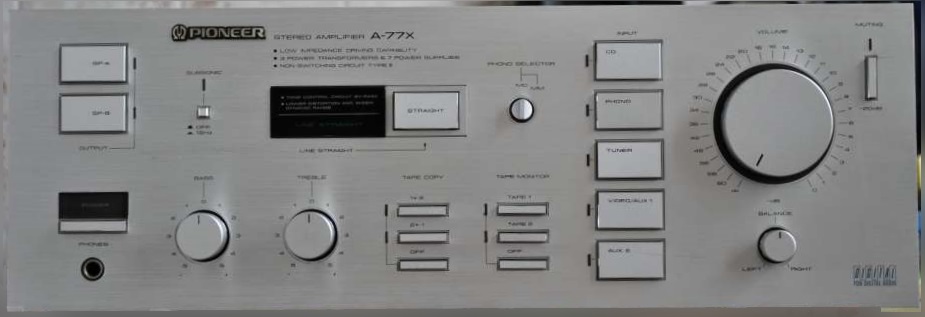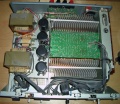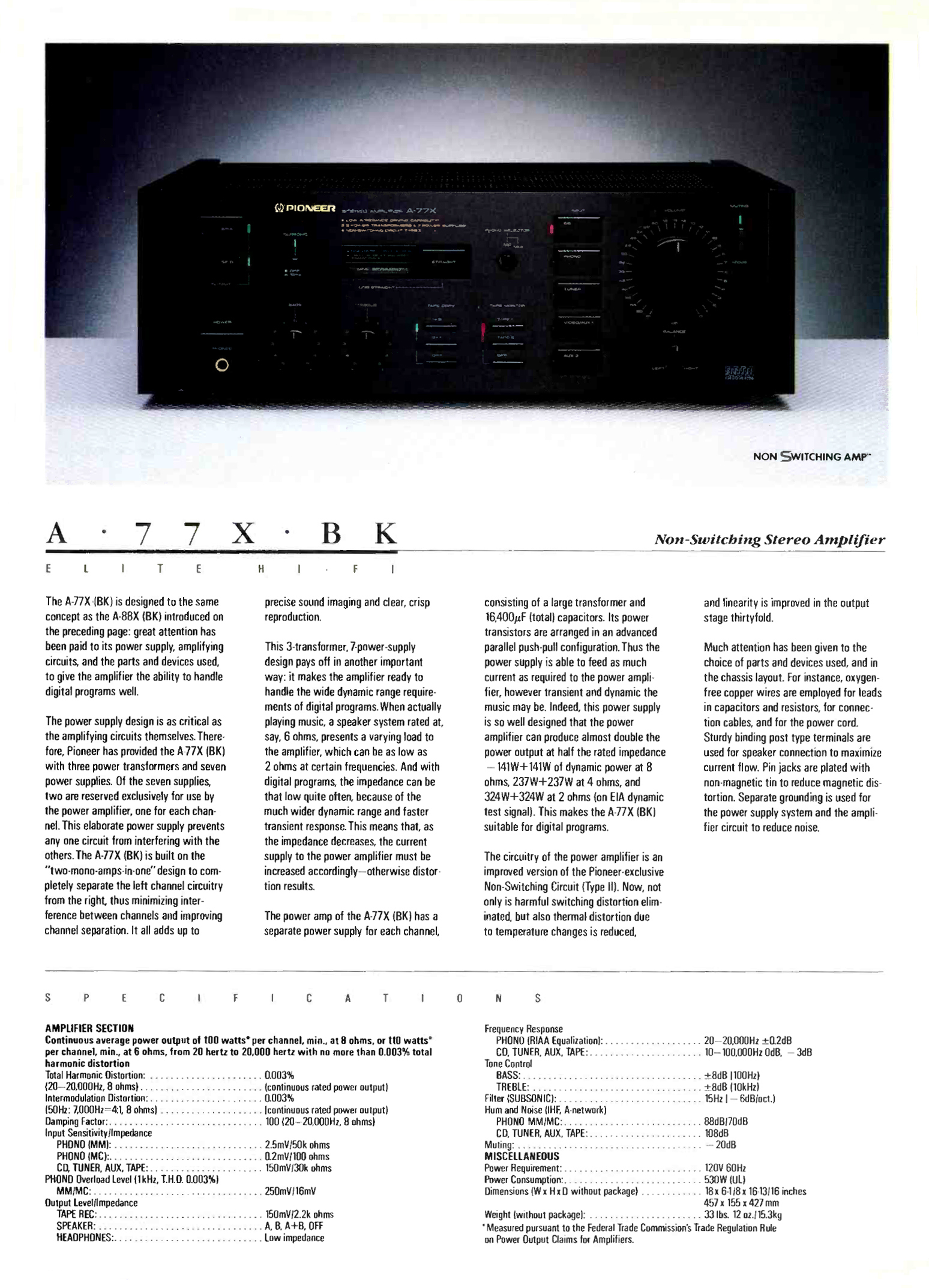Difference between revisions of "Pioneer A-77X"
(→Daten) |
|||
| (50 intermediate revisions by 11 users not shown) | |||
| Line 1: | Line 1: | ||
| − | == | + | __NOTOC__ |
| − | ''' | + | == Data == |
| − | * | + | {{navigation}} |
| − | * | + | '''General''' |
| − | * | + | * Manufacturer: [[Pioneer]] |
| − | * | + | * Model: A-77 X |
| − | * | + | * Type: Integrated amplifier |
| − | * | + | * Years of manufacture: 1985 - 1986 |
| − | * | + | * Color: Silver or black |
| − | * | + | * Remote control: no |
| − | * | + | * Power consumption: 780 W max. |
| − | + | * Dimensions: 420 x 155 x 427 mm (WxHxD), width with wooden side panels 457 mm | |
| + | * Weight: 15,3 kg | ||
| + | * Original price approx.: 1'000 DM | ||
| − | ''' | + | '''Connections''' |
| − | * | + | * Number of inputs: 7, Cinch |
| − | + | ** Phono (MM/MC switchable) | |
| − | + | CD | |
| − | + | ** Tuner | |
| − | + | ** AUX 1 | |
| − | + | ** AUX 2 | |
| − | :* Tape 1 | + | ** Tape 1 |
| − | + | ** Tape 2 | |
| + | * Number of outputs: 2, Cinch | ||
| + | ** Tape Rec 1 | ||
| + | ** Tape Rec 2 | ||
| − | |||
| − | |||
| − | |||
| − | ''' | + | '''Technical Data''' |
| − | * | + | * Continuous power: 2x 100 watts into 8 ohms, 20-20 kHz |
| − | + | * Distortion factor: 0.003 % | |
| − | : | + | * Dynamic power: |
| − | * | + | ** 8 Ohm: 137 W |
| − | * | + | 4 Ohm: 225 W |
| − | * | + | 2 Ohm: 295 W |
| − | * | + | * Total harmonic distortion: 0.003% |
| − | * | + | * Cross distortion: 50 Hz:7 kHz at 4:1, at active power 0.003% |
| − | * | + | * Power bandwidth: 10- 100 kHz (line), 20- 20 kHz (phono) |
| − | + | * Attenuation factor: 100 (20-20 kHz, 8 ohms) | |
| − | + | * Input (Sensitivity/Impedance) | |
| − | * | + | ** Phono MM 2.5 mV/ 50 kOhm, MC 0.2 mV/ 100 Ohm |
| − | * | + | Line 150 mV/ 30 kOhm |
| − | + | * Output (level/impedance): 150 mV/ 2.2 kOhm | |
| − | : | + | * Frequency response: |
| − | * | + | ** Phono: 20-20 kHz ±0.2 dB |
| − | + | Line: 10-100 kHz +0, -3 dB | |
| − | :* | + | * Tone control |
| − | * Subsonic: | + | Bass: ±8 dB (at 100 Hz) |
| − | * Mute: | + | Treble: ±8 dB (at 10 kHz) |
| − | * Direct/ | + | * Loudness: no |
| − | * | + | * Subsonic: yes (15 Hz, -6 dB/ octave) |
| − | + | * Mute: yes, -20 dB | |
| − | + | * Direct/Line-Straight: yes | |
| − | * | + | * External voltage spacing (short-circuited) |
| − | + | ** Phono MM/MC - 88/ 70 dB | |
| − | + | Line - 108 dB | |
| + | * Stereo channel separation (1 kHz) | ||
| + | ** Phono MM/MC - 70/62 dB | ||
| + | CD/Tuner, AUX 1,2, Tape Play 1,2 - 88/85 dB | ||
| + | * Loudspeaker impedance: 6- 16 Ohm | ||
| − | |||
| − | |||
| − | |||
| − | + | '''Special Features''' | |
| − | + | * Separate power supplies for one power amplifier and the preamplifier each, double mono setup. | |
| + | * Separate loudspeaker relays for each channel, electronically switched | ||
| − | |||
| − | == | + | == Remarks == |
| + | * Previous model: | ||
| + | * [[Pioneer A-70]] | ||
| − | == | + | |
| + | * Successor model: | ||
| + | * [[Pioneer A-717]] | ||
| + | |||
| + | |||
| + | '''Other models in the same series''' | ||
| + | * [[Pioneer A-22]] | ||
| + | * [[Pioneer A-33]] | ||
| + | * [[Pioneer A-44]] | ||
| + | * [[Pioneer A-66X]] | ||
| + | * [[Pioneer A-77X]] | ||
| + | * [[Pioneer A-88X]] | ||
| + | |||
| + | |||
| + | * [[Tuner: | ||
| + | * [[Pioneer F-99 X]] | ||
| + | |||
| + | |||
| + | * CD player: | ||
| + | * [[Pioneer PD-9010 X]] | ||
| + | |||
| + | |||
| + | * Tape Deck: | ||
| + | * [[Pioneer CT-A 7 X]] | ||
| + | * [[Pioneer CT-A 9 X]] | ||
| + | |||
| + | |||
| + | * Turntable: | ||
| + | * [[Pioneer PL-90]] | ||
| + | |||
| + | |||
| + | * Speakers: | ||
| + | * [[Pioneer DSS-E 6]] | ||
| + | * [[Pioneer DSS-E 10]] | ||
| + | |||
| + | |||
| + | == Pictures == | ||
| + | * Image: Pioneer A-77 X | ||
| + | [[File:A77xa.jpg]] | ||
| + | |||
| + | |||
| + | <gallery> | ||
| + | File:A77x 1.jpg|1 | ||
| + | File:A77x 2.jpg|2 | ||
| + | File:A77x 3.jpg|3 | ||
| + | File:A77x 4.jpg|The interior view with a very strong resemblance to that of the A-88X | ||
| + | File:A77x 5.jpg|On the right you can see the shielded phono board | ||
| + | File:A77x 6.jpg|6 | ||
| + | File:A77x 7.jpg|The front without front panel with the controls | ||
| + | </gallery> | ||
| + | |||
| + | |||
| + | * Excerpt from brochure: Pioneer A-77 X | ||
| + | [[File:1985 Pioneer Elite Katalog-5.jpg]] | ||
| + | |||
| + | |||
| + | == Reports == | ||
| + | * Report in "FonoForum" 3 / 1986 | ||
| + | |||
| + | |||
| + | * The models A-77X and A-88X were the elite amplifiers of the Pioneer series at that time, with the A-88X leading the series both in terms of equipment and performance. | ||
| + | * The units probably evolved from their predecessors, the A-60 through A-80, which had fairly similar specs. | ||
| + | * All models (starting with the A-66X) "naturally" have metal fronts and knobs. | ||
| + | * The volume knob of the A-88X and A-77X is completely made of metal and is fixed to the potentiometer axis with a grub screw (on later A-77X, however, the knob is just plugged onto the corrugated axis of the potentiometer). | ||
| + | |||
| + | |||
| + | '''Repair Note:''' | ||
| + | * If the red LEDs are no longer lit and the green ones are only dimly lit, then the power bulb in the green rubber above the main switch has probably burned out (12V , 0.1A). | ||
| + | It is located as a "series resistor" in front of the series regulator, which supplies the other displays with voltage. | ||
| + | |||
| + | |||
| + | == Left == | ||
| + | |||
| + | |||
| + | [[Category:Integrated amplifier]] | ||
Latest revision as of 15:00, 5 June 2020
Data
General
- Manufacturer: Pioneer
- Model: A-77 X
- Type: Integrated amplifier
- Years of manufacture: 1985 - 1986
- Color: Silver or black
- Remote control: no
- Power consumption: 780 W max.
- Dimensions: 420 x 155 x 427 mm (WxHxD), width with wooden side panels 457 mm
- Weight: 15,3 kg
- Original price approx.: 1'000 DM
Connections
- Number of inputs: 7, Cinch
- Phono (MM/MC switchable)
CD
- Tuner
- AUX 1
- AUX 2
- Tape 1
- Tape 2
- Number of outputs: 2, Cinch
- Tape Rec 1
- Tape Rec 2
Technical Data
- Continuous power: 2x 100 watts into 8 ohms, 20-20 kHz
- Distortion factor: 0.003 %
- Dynamic power:
- 8 Ohm: 137 W
4 Ohm: 225 W 2 Ohm: 295 W
- Total harmonic distortion: 0.003%
- Cross distortion: 50 Hz:7 kHz at 4:1, at active power 0.003%
- Power bandwidth: 10- 100 kHz (line), 20- 20 kHz (phono)
- Attenuation factor: 100 (20-20 kHz, 8 ohms)
- Input (Sensitivity/Impedance)
- Phono MM 2.5 mV/ 50 kOhm, MC 0.2 mV/ 100 Ohm
Line 150 mV/ 30 kOhm
- Output (level/impedance): 150 mV/ 2.2 kOhm
- Frequency response:
- Phono: 20-20 kHz ±0.2 dB
Line: 10-100 kHz +0, -3 dB
- Tone control
Bass: ±8 dB (at 100 Hz) Treble: ±8 dB (at 10 kHz)
- Loudness: no
- Subsonic: yes (15 Hz, -6 dB/ octave)
- Mute: yes, -20 dB
- Direct/Line-Straight: yes
- External voltage spacing (short-circuited)
- Phono MM/MC - 88/ 70 dB
Line - 108 dB
- Stereo channel separation (1 kHz)
- Phono MM/MC - 70/62 dB
CD/Tuner, AUX 1,2, Tape Play 1,2 - 88/85 dB
- Loudspeaker impedance: 6- 16 Ohm
Special Features
- Separate power supplies for one power amplifier and the preamplifier each, double mono setup.
- Separate loudspeaker relays for each channel, electronically switched
Remarks
- Previous model:
- Pioneer A-70
- Successor model:
- Pioneer A-717
Other models in the same series
- [[Tuner:
- Pioneer F-99 X
- CD player:
- Pioneer PD-9010 X
- Tape Deck:
- Pioneer CT-A 7 X
- Pioneer CT-A 9 X
- Turntable:
- Pioneer PL-90
- Speakers:
- Pioneer DSS-E 6
- Pioneer DSS-E 10
Pictures
- Image: Pioneer A-77 X
- Excerpt from brochure: Pioneer A-77 X
Reports
- Report in "FonoForum" 3 / 1986
- The models A-77X and A-88X were the elite amplifiers of the Pioneer series at that time, with the A-88X leading the series both in terms of equipment and performance.
- The units probably evolved from their predecessors, the A-60 through A-80, which had fairly similar specs.
- All models (starting with the A-66X) "naturally" have metal fronts and knobs.
- The volume knob of the A-88X and A-77X is completely made of metal and is fixed to the potentiometer axis with a grub screw (on later A-77X, however, the knob is just plugged onto the corrugated axis of the potentiometer).
Repair Note:
- If the red LEDs are no longer lit and the green ones are only dimly lit, then the power bulb in the green rubber above the main switch has probably burned out (12V , 0.1A).
It is located as a "series resistor" in front of the series regulator, which supplies the other displays with voltage.







